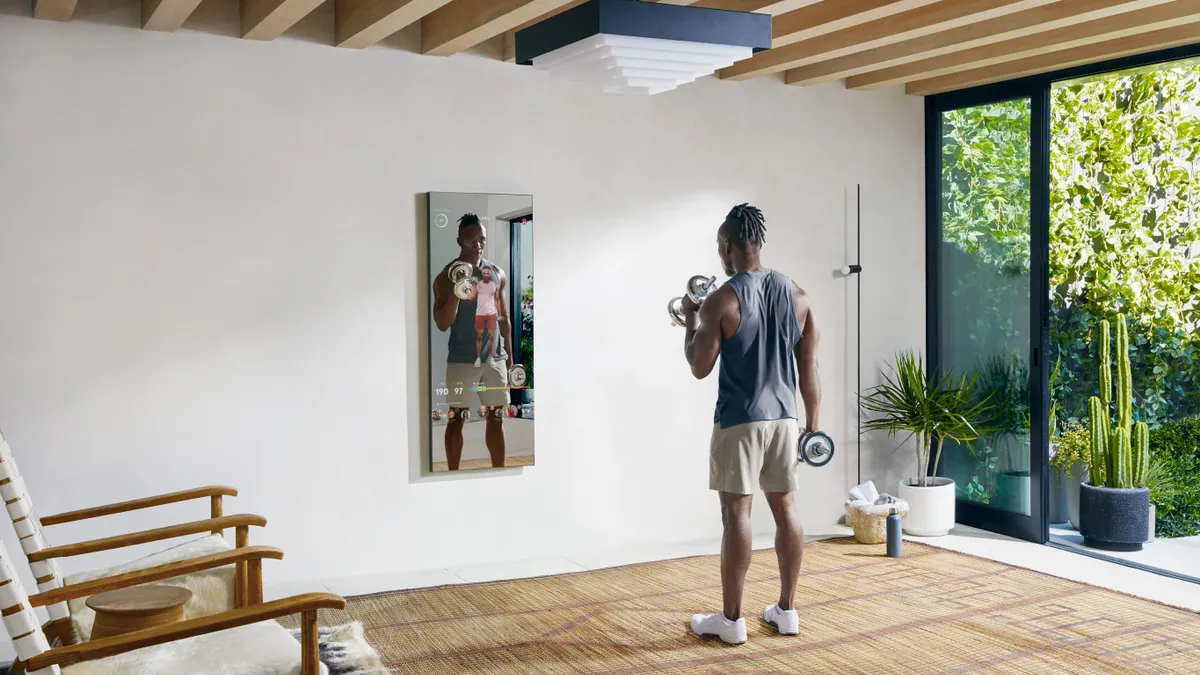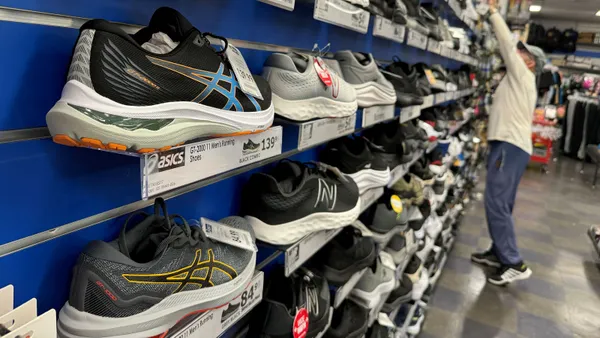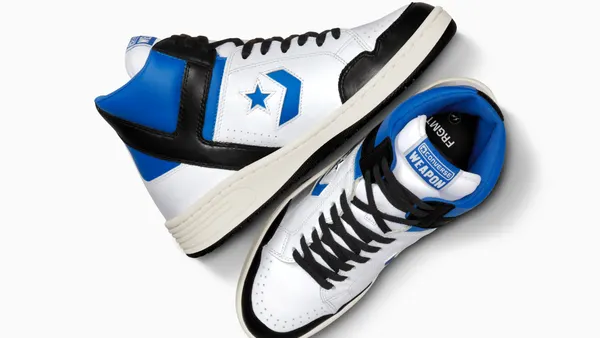Lululemon executives mentioned Mirror 30 times in its latest quarterly earnings call.
Enthusiasm over the technology isn't a big surprise — in June 2020, Lululemon made a big play by acquiring the at-home fitness company. It seemed to be a natural next step forward. Only a year earlier, the retailer joined in a $34 million Mirror investment round.
The timing for such an investment seemed ripe. The U.S. was a few months into a pandemic where everyone was stuck at home, locked out of events, gyms, and exercise classes. Instead, people were turning to retailers to purchase workout equipment and signing up for streaming services where fitness gurus were only an app away. The demand was so high that Peloton ran into supply chain constraints, and there was even a dumbbell shortage.
Mirror operates as a stand-alone company within Lululemon and dubs itself "the nearly invisible home gym." Shoppers need only two feet of space, and the product fits inauspiciously within a home. Mirror opens up a world to its users, who can pick from an impressive number of classes within 50 genres, from beginner to expert levels, live or from a library of thousands of on-demand classes. The technology also delivers real-time feedback based on individual goals and allows people to connect with other Mirror users. It is a perfect product for those who are athletically minded and newly aware of the idea that a gym membership isn't the only way to get gains.
It also marks a different way Lululemon as a company is creating deeper bonds with its customer base. While the company has always had a devoted following for its apparel (and, perhaps more importantly, the aspirational lifestyle it represents), its current dreams are reaching beyond its brick-and-mortar stores. Lululemon is looking to become a bigger and more technologically savvy lifestyle company that focuses on wellness.
"Lululemon was very astute in recognizing that Mirror gave them an opportunity to be in people's homes," said Howard Meitiner, managing director at Carl Marks Advisors and former president and CEO of Sephora USA. "It's wrong to think of it just as a virtual exercise tool. It's only limited by people's imagination."
Patents may hint at future plans
While Mirror may be a physical representation of the next stage of Lululemon's growth, there are clues to other directions the company is headed. And it is very clear that it has big plans for the future.
Lululemon is all-in when it comes to innovation. CEO Calvin McDonald frequently uses variations of that buzzword both when talking about the company's current offerings and its future. "Our sweet spot is creating versatile and stylish products that include technical innovation, comfort and flexibility," he said on a recent call with analysts.
And it's not just talk.
Part of Lululemon's vision is demonstrated via its investments into intellectual property. Since the start of 2021, the company has published a handful of patents or continuations of patent applications. Some of them are focused on apparel design, like shorts, a bra, sleeve cuffs for a garment and a leotard.
Others seem like an organic outgrowth of wellness items that Lululemon would naturally have in its product lineup. For example, an exercise mat that has a three-dimensional surface texture.
"Consumers are demanding improved mats for yoga and other activities," the patent description states. "One problem with existing mats is that they often provide inadequate support for a user's body. Another problem is that the upper surface or face of existing mats is often slippery. A further problem with existing mats is that they are often heavy and hard to roll-up or otherwise transport especially thicker mats that do provide adequate support."
But Lululemon isn't focused just on yoga mats and leotards. The company is also looking into methods for determining wellness metrics. Factors that will be examined include recording a users' emotional state, analyzing stress, recording activity and providing recommendations so users can improve their wellness.
"Emotional health is intimately intertwined with physical health …. the relation between physiological conditions and emotional health has become of increasing interest," the document states. It goes on to say that, according to studies, stress and emotional factors may increase the risk of disease, reduce productivity and restrict quality of life.
An answer may lie in technology that provides real-time feedback and coaching to individuals, and the patent states that its technology will provide a method for determining wellness metrics using at least one biosensor to acquire a measured signal.
It seems like biosensors may be at the forefront of at least another segment of the retailer's technical strategy.
A patent published in March revolves around a sensor belt, where one portion faces the wearer while the other portion faces away. The document goes on to point to biometric monitors that may be used with sensors for monitoring signals such as heart rate and skin temperature. Some of those sensors may require contact with the wearer's skin, others have a sensor mount that can be worn on different parts of the body (including a wrist, ankle, or on a wearer's waist) and others may be attached to or integrated with a piece of clothing or an accessory, like a bra, pants or hat.
When asked about recent patents and future plans regarding upcoming technology and its application, a spokesperson for Lululemon stated, "We routinely file patents to protect innovations we are working on. We can't comment on pending registrations."
It's important to keep in mind that just because a company sets out to obtain a patent doesn't mean that it will ultimately create an end product. "There is no requirement to actually use an invention that is covered by a granted patent. But in most instances the patent applicant does intend to bring the technology to market, at least when the application is filed," said Bruce Dahl, intellectual property attorney at Fennemore.
Dahl also noted that those patent applications that relate to methods of determining wellness, mood and well-being and provide activity recommendations are "natural complements" to goods already sold by Lululemon and the lifestyle of its customers. Possible intangible benefits of this type of technology include "strengthening goodwill in the Lululemon brand and increasing customer loyalty." A tangible benefit, he added, is that if the technology is monetizable it can add to the retailer's revenue stream.
Retail and patents
So, why would a retailer care about patents?
First and foremost, it can give companies an advantage. "Owning intellectual property, whether in the form of patents, trademarks, or copyrights, can be used to leverage your competitive position and distinguish your products and services from others," said Dahl.
Other retailer motivations for developing intellectual property, such as patents, include attracting technical talent to a company, protecting research and development investments, being able to receive research and development state tax credits, or appearing innovative to the market, according to Gary Solomon, partner at Foley & Lardner.
"In many cases, the retailer has become a brand unto itself," Solomon wrote in emailed comments. "Target, Walmart, and Amazon, among others, have been developing their own products for many years."
Additionally, Solomon stated, traditional brick-and-mortar companies are now competing with virtual sellers, including Amazon and eBay, as well as smaller, innovative companies that have prominent social media followings. "As the traditional and online retailers strive to differentiate themselves from the competition, the retailers look to have their own innovations to create new products and brands to drive customer demand."
Enduring enthusiasm for Lululemon
The strategy behind Lululemon's breakout tech product, Mirror, appears to be working. The retailer is currently on track to deliver between $250 million to $275 million this year, according to McDonald. By later this month, Mirror will be in 90 Lululemon physical stores, with the company anticipating it will have nearly 200 shop-in-shops by the holiday season.
The brick-and-mortar representation is important for the company, according to Neil Saunders, managing director of GlobalData, in comments regarding the retailer's first quarter performance. "We ... believe that stores are vital for demonstrating and selling the Mirror device which, going forward, will be another important part of Lululemon extending its reach."
However, the company may be playing a bit of a long game with the investment, as Wells Fargo analysts led by Ike Boruchow noted by stating that CFO Meghan Frank won't commit to a breakeven timeline for the concept. "[T]he situation with Mirror is a bit of a head-scratcher, as management seems very pleased with the early results, yet they continue to shy away from identifying profitability timelines."
The trajectory of Mirror is an important one for Lululemon. As McDonald teased on a call with analysts, more features will be added this year, including more live classes, and there are plans to expand to Canada as the retailer's first international market.
And following a strategy of further connection with consumers via technology may be a very savvy approach. "The power of Lululemon has been not only in the quality of its products but the brand itself and the experience it builds with customers," said Carlos Castelán, managing director of business management consulting firm The Navio Group.
"There aren't many brands that could pull this off like Lululemon but the company's understanding of its customer - while always serving up high-quality products – allows [it] to expand into new spaces that meet a customer's overall fitness and lifestyle needs," Castelán said.
The path that Lululemon has embarked upon with Mirror points to retail that goes beyond a brick-and-mortar experience and even perhaps beyond e-commerce. Instead, the technology that the company is experimenting with may be more fully immersed in deeper integration in its customer's life through wellness initiatives and being present in their home in new ways.
"That's what they are looking at — in a broad sense — digital expansion of their overall brand proposition as they are in more people's homes," Meitiner said. The company is going to slow down "only if they stop being creative. There's nothing to stop them."













